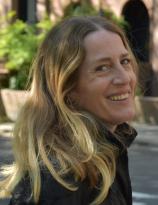Author Talk: June 18, 2010
Though she has made a name for herself penning the hugely popular and bestselling Gossip Girl series for teens, Cecily von Ziegesar’s new novel, CUM LAUDE, is aimed at an older audience and centers on a group of college freshmen testing the boundaries of their first taste of freedom. In this interview, von Ziegesar explains why she chose to shift away from YA literature in this latest project and recalls some of the real-life experiences that served as inspiration. She also elaborates on the book’s message, reveals the origin of her characters’ memorable names, and mentions some of her favorite writers.
Question: What made you decide to write a novel for adults at this moment in your career? Was it a new idea or something you’d been considering for awhile?
Cecily von Ziegesar: The first Gossip Girl book came out in 2002 so my original readers, who were older teens then, are now in their twenties. It seemed like a logical step for me, and I was ready to try my hand at something new.
Q: How is CUM LAUDE different than your YA novels?
CVZ: I’ve always tried to write entertaining books that feel true. When I wrote Gossip Girl I tried very hard not to think about it as a book for teens. I just wrote the sort of book I’d want to read, with teenaged protagonists. The same goes for this book, except that the characters are older and are therefore confounded by things that college-age people are confounded by. With no parents on the premises they have even more freedom than they did in high school. What interests me is how they take advantage of or abuse or are frightened by that freedom, and the steps they take toward defining themselves.
Q: Can you talk a little bit about what inspired CUM LAUDE?
CVZ: I started with my college experience at Colby. I remember my first day all these guys knocking on my door because they thought I looked pretty in my Face Book photo. This was a printed Face Book --- we didn’t have the online version yet. Anyway, when the boys actually met me they were like, “Oh, sorry. I thought you were someone else.” It got me thinking about your expectations before you start school, and then the reality of who you wind up with. CUM LAUDE is about a group of freshman at a small liberal arts college in Maine. They would not normally have met or become friends or lovers, but they are thrown together on their orientation trip the week before classes begin. I’ve also always wanted to write a fictional version of one of my older brothers, who has a lot of problems, and that’s something I tackle in this book.
Q: Why did you set the book in 1992?
CVZ: I graduated in 1992 so I felt I could write most accurately about college in that moment. In the end though, I think the college experience is so universal that it doesn’t really matter what year it is.
Q: Was your experience at Colby anything like the story in the book?
CVZ: Sort of, but not really. It’s fiction. Oh, but I did kind of steal the van on my orientation trip. I didn’t go anywhere though. I just did 360’s and got in trouble with our trip leader. I was just so excited about finally being at college that I had to do something crazy!
Q: What did you study in college?
CVZ: I was an English major with a concentration in creative writing. And my senior thesis was a collection of short stories and poems. I really don’t know what else I could have done. I have no knack for anything else. I’ve been writing stories and poems since I was tiny.
Q: Did you graduate cum laude?
CVZ: Yes.
Q: Does the book have a message?
CVZ: That what you do outside of class is just as important or even more so as what you do in class. Also, life can be very random. In a good way.
Q: You and Shipley Gilbert, CUM LAUDE’s heroine, are both blondes from Connecticut; do you have anything else in common? Or are you more like one of the book’s other characters?
CVZ: I’m NOT from Connecticut!! I grew up in Manhattan and graduated from high school in Manhattan. My family moved to Connecticut my junior year of high school, but kept an apartment in Manhattan, close to my school, so my father and I only had to commute on the train a few days a week. I rode horses and kept them at a barn in Connecticut and competed every weekend at shows all over New England, so I got to know Connecticut and its environs very well. I drove myself to the shows and sometimes even to school in Manhattan, which was rare for a city kid, to be driving around by herself at age 16. There’s a little bit of me in all of my characters, but my books are totally fictional, not memoirs. The blonde girls I write about are always more beautiful, poised, alluring, confident and taller than I ever was. I guess I’m sort of obsessed with humanizing the beautiful girl --- the girl everyone wants or wants to be --- instead of putting her on a pedestal. There’s a good chance that girl will turn up in every book I write because she’s pretty consistent about turning up in every aspect of life --- school, work, the subway, the restaurant where you ate last night.
Q: Shipley Gilbert, Tragedy Gatz, Serena van der Woodsen: how do you come up with names for your characters?
CVZ: Having grown up with an unusual name, I like to invent names that are difficult but sound real, and hopefully that are memorable.
Q: Which character or scene was most fun to write?
CVZ: The dumpster diving scene. I love making big, cute guys do really stupid things.
Q: Are you still writing Gossip Girl and It Girl books?
CVZ: The last It Girl will be out soon, and the last Gossip Girl just came out, a sort of Christmas party special. And that’s it. It’s been wonderful, but it’s time to move on.
Q: Tell us a little about your writing process.
CVZ: I live in Brooklyn and I rent a little studio in downtown Manhattan to write in. It’s very important for me psychologically to get dressed, drop my kids off at school, and ride the subway to my office, so I’m in the work mindset. Otherwise I’d just stay at home in my pjs eating potato chips, maybe go for a run, do the laundry, and prune the roses on my terrace. There’s nothing in my office except a table with a laptop and a printer on it and a bookshelf. The table faces a brick wall where I’ve pasted two inspirational fortune cookie sayings: “Inspiration is in the details” and “Determination will get you through this.” So I look at those and I try to write. Usually I have an outline that I don’t follow at all. On a really good day I’ll write eight to ten pages. On a really bad day I shop online for hours and write only a paragraph. For some reason I do my best writing starting at around three o’clock in the afternoon, which can be frustrating if I get on a roll because I like to be home by six to make dinner for my children.
Q: What advice would you give to college students who want to be writers?
CVZ: Don’t think too much about the kind of story you want to tell or whether someone is going to want to read it. Just write something you would want to read. Trust your instincts. Sit down and work at it. And don’t be afraid to throw the first half of it out and start from the middle. The middle is usually where you really get cooking. You know when people recommend a book to you and they’re like, ‘The first 50 pages is really boring, but then it gets good’? I don’t want to write that book. I want my books to be suspenseful from page one.
Q: Who are some of your favorite authors?
CVZ: F. Scott Fitzgerald. Raymond Carver. Edith Wharton. Leo Tolstoy. Henry James. Jane Austen. Thomas Hardy. Anton Chekov. Guy de Maupassant. George Eliot. Helen Fielding. Zoe Heller. Nick Hornby. A.M. Homes. Dave Eggers. Martin Amis. Vladimir Nabokov.
© Copyright 2010, Hyperion. All rights reserved.
• Click here now to buy this book from Amazon.




